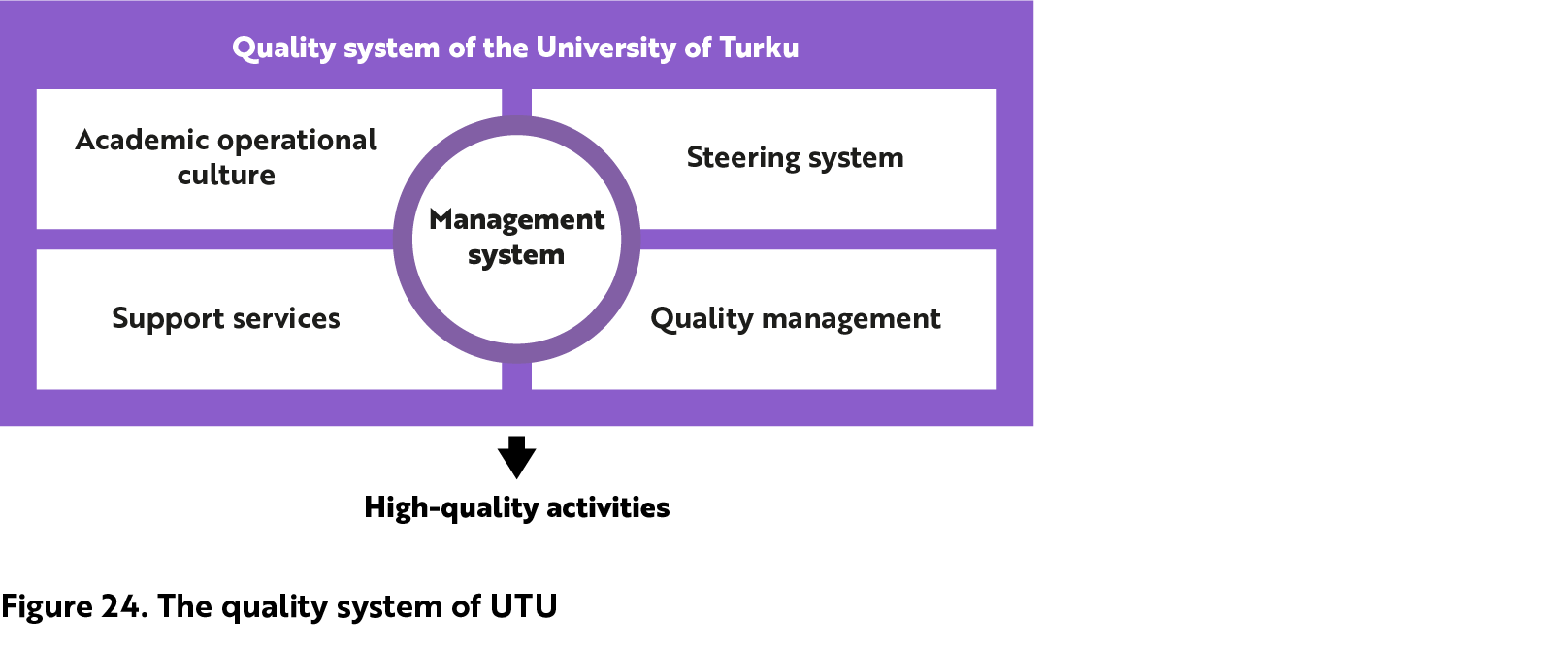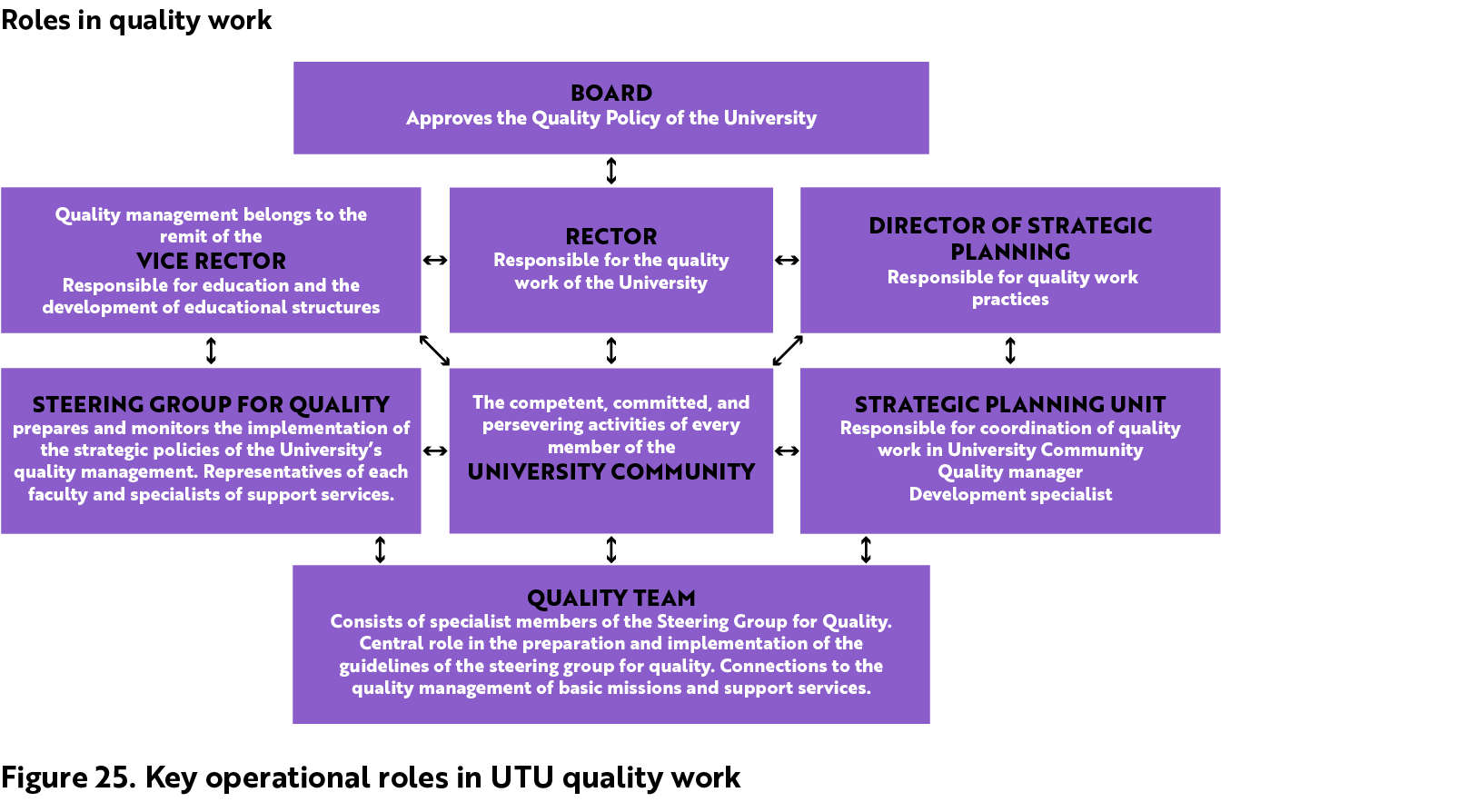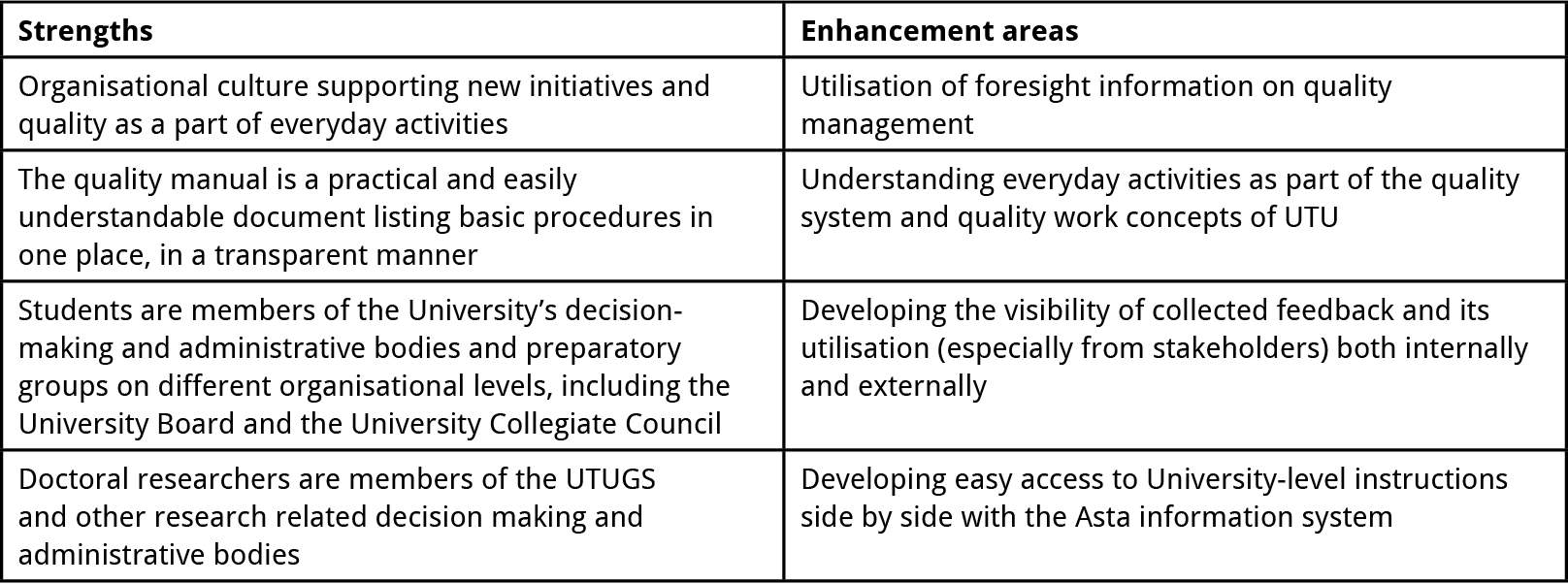Targets of quality work in UTU include research, education, and societal interaction, and the services and functions supporting them
The UTU Quality Policy steers the development of quality work by defining the main principles of quality work. The Quality manual describes the UTU Quality System and the principles for its development. The quality documentation is prepared in collaboration with the UTU community.
The Quality System of UTU is based on the academic operational culture and it supports the realisation of the basic missions by steering, support services and quality management.

The entire UTU community participates in the continuous development of high-quality operations as part of their work. Structurally, quality work follows the organisational structure that consists of faculties, independent units and support services. Figure 25 presents the key operational roles of quality work in UTU.

As part of the steering, annual planning is used to monitor the basic missions in faculties and independent units. The process is connected to the monitoring of the Strategy and its Policy Programme. The annual target negotiations with the UTU management give feedback and guidelines to the development activities.
Various feedback systems, functional and up-to-date instructions, and well-functioning good practices support the basic missions. Quality assurance is implemented with assessments, accreditations, certificates and rankings, and methods of risk management and internal control. Unit- or function-specific quality systems are utilised, for example, in laboratory work.
UTU support services require a well-functioning feedback system which includes the opportunity to give feedback, methods of documenting and handling feedback, and communications practices. UTU’s goal is transparency and interaction in giving and handling feedback.
University-level instructions are available on the intranet for the community members. Instructions are constantly monitored and updated according to the needs of UTU and the surrounding society.
Special focus has been put on good practices among the entire UTU community. The Strategic Planning unit and the University´s Human Resources collaborate with the UTU community to promote good practices. Information on good practices is collected, shared, discussed, and developed continuously on an internal forum which is accessible to the entire community. Concise information on good practices is published on the intranet to keep the community up to date on the latest development. In addition to good practices used on the University level, there are good practices in and between certain task areas or units.
The multidisciplinary mentoring programme is an example of a good practice which has been disseminated throughout the University. The programme supports students’ transition into working life as well as the professional development and career planning of researchers and other staff.
Students, staff and stakeholders have active roles in developing UTU
The values defined in the UTU’s Strategy include openness and communality. A culture supporting quality and new initiatives is built in collaboration with the UTU community. The community members and external stakeholders can make initiatives, participate in developing the University in different ways, and give feedback on the operations. The role of international staff and students is supported as described in UTU’S International Programme.
The personnel make an impact on the University’s activities, its results, and work community in several ways through their work, expertise, and methods. In addition to carrying out work duties, participating in the operations of working groups on different organisational levels, the UTU Board, and the UTU Collegiate Council is an important channel of influence. The Strategy and the annual planning, monitoring and reporting practices enable regular feedback and initiatives.
Students contribute actively to the development of teaching and learning. Key opportunities to influence the operations include the student feedback systems. Students are members of the UTU’s decision-making and administrative bodies and preparatory groups on different organisational levels, including the UTU Board and the UTU Collegiate Council. By communicating and collaborating, the University and the Student Union (TYY) ensure that the roles of both UTU and TYY regarding the University’s educational mission are fulfilled.
Doctoral researchers participate actively in the development and decision-making of the doctoral programmes and UTU Graduate School. Regular feedback surveys are available for doctoral researchers as a part of their doctoral training (Figure 6).
The external stakeholders can influence the University’s operations as members of the UTU Board, councils or advisory boards, and in different working groups. Co-operation with the UTU stakeholders supports the development of the basic missions, and strengthens the University’s impact. Stakeholders can also participate in teaching and guidance and provide professional life connections. A key channel for stakeholder co-operation is the alumni activities, which is developed with an operational plan.
Operational plan for quality management is connected to everyday activities in basic missions, steering, and development
The steering Group for Quality Work prepares and monitors the implementation of the strategic policies of UTU’s quality management. The duties of the Group include the coordination, maintenance, development, documentation and evaluation of the quality system. The Quality Team has an essential role in the preparation and implementation of the guidelines of the Group.
The Group steers and approves the operational plan for quality management, two of which are drawn up during the audit period. A central focus in the operational plan is to connect quality work to everyday activities in the basic missions, steering, and development. The Group constantly monitors the development of quality work and assesses the operational plan at the end of the planning cycle. The Rector decides on further actions required by the assessments.
